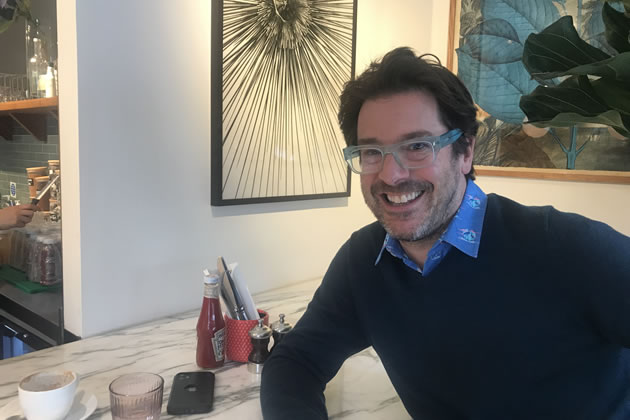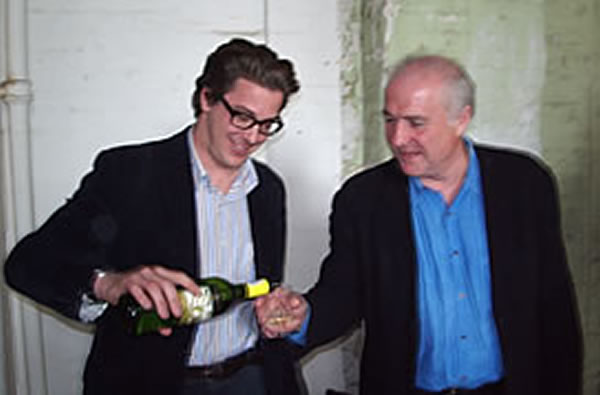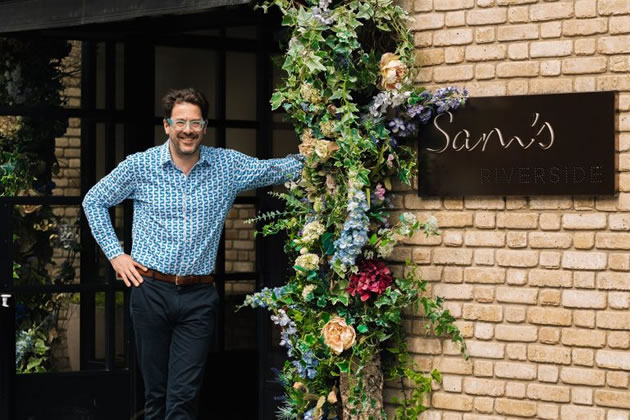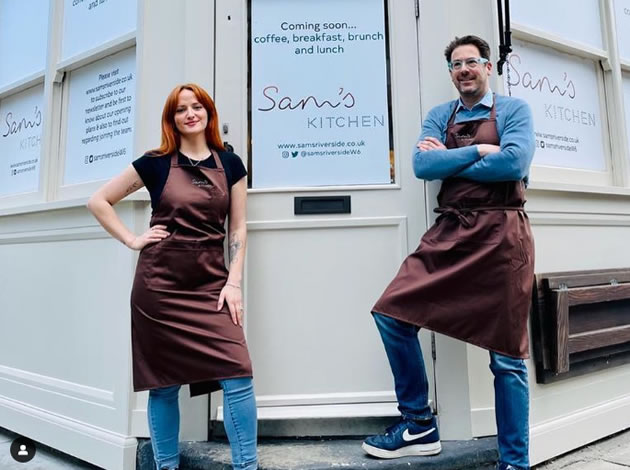Sam Harrison on His Journey to Hell and Back
Local restaurateur opens up about his mental health battle

Sam Harrison in Sam's Kitchen on Turnham Green Terrace
|
June 8, 2024
A staff meeting at a restaurant to discuss menu options shouldn’t be occasion for turmoil , but Sam Harrison can recall one in which he was on the point of throttling a chef.
Looking back to 2014, he now sees that, at this juncture, he was close to the nadir of a downward spiral caused by a combination of a highly pressured work-life and a growing dependence on painkillers, linked to chronic back pain led to his admission that he needed help.
Having worked at for Rick Stein as front of house down in Padstow, Sam’s first independent venture into the restaurant business in 2005 didn’t lack ambition. With backing from his mentor, he took on, not only the launch of a 120-cover Sam’s Brasserie in a back alley in Chiswick, but the conversion of the building that used to be the Sandersons wallpaper factory.
The restaurant in Barley Mow Passage wasn’t merely successful but established itself as a Chiswick institution, within a year it was shortlisted for Time Out’s best local restaurant and was consistently positively reviewed.
 }
}
Sam Harrison and Rick Stein toast the launch of Sam's Brasserie in 2005
Like the proverbial swan on the water, the apparently smooth progression wasn’t as effortlessly graceful as it appeared from the outside. By 2007 , Sam had opened up another restaurant in Balham and it wasn’t long before his life consisted of working, travelling from south to west London on a moped and a minimal amount of sleeping.
Although, this period might seem like a gold age for restaurants in retrospect, the reality was different. When Sam’s Restaurant opened, its competitors could just about be counted on one hand. Le Vacherin and La Trompette were among the few other options for a high-quality meal out in Chiswick. As time progressed, the situation was changing as more venues opened and, while somewhere like Byron or Cote might not be offering exactly the same sort of experience, they provided another option for a family wanting reasonably priced dining.
By 2012 the challenges of running two restaurants had started to take its toll.
Persistent back problems eventually required him to have surgery on his lower back. His surgeon informed him that people in the restaurant business made up a significant proportion of those that he operated on with chefs and front of house staff particularly prone to back problems. Although, he was assured the operation had been completely successful, Sam afterwards was still living with pain with sciatica regularly leaving him unable to move.
A high-pressure work environment, alongside a necessary reliance on medication, was never going to be sustainable, but it was not until 2014 when the crisis point was reached and he crashed both physically and mentally. After the particularly difficult staff dealings, referred to earlier, he phoned his mother for advice . Sam’s family had had experience with mental illness and his mother urged him to talk to a GP but, by this time, he was in what he describes as a dark place and the feelings of extra frustration he felt reappeared when the doctor explained what had become all too apparent to those around him. Sam was admitted to a mental health institution as he says, ‘up the walls, literally kicking and screaming’. He spent six weeks in hospital under care and he eventually started to feel relief rather than despair at his situation.
The general managers of his restaurants stepped up, perhaps realising that they had let too much weight fall on Sam’s shoulders, and diners continued to enjoy their meals unaware of the reasons for Sam’s extended absence. His father called in to reassure staff and his investors were sympathetic to his situation.
He was discharged from hospital by Christmas and, while Sam hadn’t decided to get out of the business, the owners of the Hawksmoor Group, perhaps knowing his personal situation, made an offer for the Chiswick and Balham restaurants early in 2015. The amount was one that might have been considered even if Sam hadn’t experienced the recent trauma so, to the shock of many loyal customers, Sam’s Brasserie was no more.
A move to a rented cottage in Oxfordshire provided a chance to recuperate and before too long Sam was looking to get back into the hospitality game. He bid for a country pub hotel in the Cotswolds and fantasised about taking over Brown’s in Oxford but nothing was ever fully followed through on.
The harsh truth was that being discharged from hospital did not mean Sam was fully recovered. He remained on a regimen that included anti-depressants and therapy, and he still needed to end his dependence on painkillers. It took over four years to be fully off medication. He believes that, although outwardly well, a key part of his makeup was dysfunctional as the drugs took away some of the enthusiasm and drive that had previously kept him going. When a counterbid stymied plans for a new venture, he reacted with relief rather than disappointment. Although he loved the countryside, he remained a city boy more at home with pavements grey than the lush Cotswolds countryside.
By 2019, free now of any pain medication and with the passion in the business fired up again, he knew he had to return. His family said that he should go back to working for Rick Stein on a salary which would give him the joy of working in the industry again, without the stress of his name above the door, but he refused to consider this option. The opportunity came up to take the site at the Riverside Studios which appealed to him being born and raised just down the river in Fulham near Craven Cottage.
By this stage, the restaurant business operated in a very different way compared to when he set up his first venture. For one thing, banks weren’t lending to hospitality despite his record of launching and selling a successful restaurant and paying back his creditors.
Fortunately, investors were not hard to find as many of his former customers from Chiswick had been keeping tabs on him and were anxious to support his next act. They were aware of his medical history but discounted it as a consideration when they stumped up their money. This provided him with the funds to fit out the new Sam’s Riverside premises in Hammersmith towards the end of 2019. Nothing could possibly go wrong now….

Sam outside Sam's Riverside in Hammersmith
The restaurant was shut, along with every other one in the country four months later. All the investors’ cash had been absorbed and the bank account was empty.
When asked what gave him the fortitude to keep going when he might have been acutely vulnerable to such a setback he said, “When what was happening became apparent, there was no talk of giving up. Everyone involved said we would fight, and that is exactly what we did. There was simply no choice.”
Sympathetic investors held steady and staff were paid even before the furlough scheme was announced. A crowdfunder raised over £100,000 with much of the money coming from his former Chiswick clientele and Sam’s Riverside survived.
Another big change in the way restaurants operated between 2005 was the rise of social media. When Sam’s Brasserie was due to get its first review from Fay Maschler in the Evening Standard, he waited by the newsstand for the delivery of the early edition. The review was good and she went on to name him ‘Most Promising Young Old Etonian’ that year.
Sam admits a big factor in his breakdown was sensitivity to criticism, particularly online, which he found it impossible to not take personally and he brooded over even lukewarm praise for Sam’s Brasserie as Facebook, Twitter and Instagram started to enter into the equation.
Now he believes he is a much more grounded person. When his crisis came, he was on his own but now he has a partner and a two-year-old daughter which delivers a sense of perspective and deprives him of the time to stew over a disobliging comment. He can now see the upside of the digital world for his trade. Sam’s Riverside bookings are particularly strong when there is a popular show in local theatres and people coming in from out of town want to eat well before or afterwards. Positive Trip Adviser ratings make his restaurant a top choice and he says the best ever takings came when Sister Act was at the Eventim Apollo and Woody Harrelson next door at Riverside Studios, which also introduced some incredible A-list celebrities to the restaurant.
Other factors that he feels make now different to 2014 is the role that his business partner Fanny Stocker plays. Her grip of the books and the day-to-day operations means that he can handle what is thrown at him while being the 51-year-old father of a toddler.
When challenged on the dangers of over extending himself and a relapse in his mental health, he says, that while he has an obsessive personality which he believes is the opposite side of the coin of creativity, he is ‘keeping it real’. He now has six outlets including the recently relaunched Sam’s Kitchen on Turnham Green Terrace and Sam’s Waterside in the Brentford Project. He adds, “I can’t see myself not working and I won’t stop for the next decade at least. I’m still getting a buzz from it all and I wan’t to be personally involved in every site, but now I have a structure in place, there will be holidays and time to relax.”

Sam at the launch of the original Sam's Kitchen in Hammersmith
Theoretically, if there was a chance to make Sam’s like Bill’s and sell the concept for a large sum of money, he didn’t absolutely rule it out but pointed out that when you get a full English in Sam’s Kitchen, it is cooked by a trained chef and what they do isn’t amenable to be turned into a template for mass reproduction. In its present form he believes the maximum number of outlets, to protect both his well-being and the quality of the product, was ten and any new branches would be nearby.
The long vacancy of the Barley Mow Passage site after two failed attempts to replicate Sam’s original success is perhaps the best testament to what he has brought to the local hospitality industry.
Sam asked that mention be given to the Charlie Waller Trust, a mental health charity who he says were a huge help to him and do incredible work.
Like Reading Articles Like This? Help Us Produce More This site remains committed to providing local community news and public interest journalism. Articles such as the one above are integral to what we do. We aim to feature as much as possible on local societies, charities based in the area, fundraising efforts by residents, community-based initiatives and even helping people find missing pets. We’ve always done that and won’t be changing, in fact we’d like to do more. However, the readership that these stories generates is often below that needed to cover the cost of producing them. Our financial resources are limited and the local media environment is intensely competitive so there is a constraint on what we can do. We are therefore asking our readers to consider offering financial support to these efforts. Any money given will help support community and public interest news and the expansion of our coverage in this area. A suggested monthly payment is £8 but we would be grateful for any amount for instance if you think this site offers the equivalent value of a subscription to a daily printed newspaper you may wish to consider £20 per month. If neither of these amounts is suitable for you then contact info@neighbournet.com and we can set up an alternative. All payments are made through a secure web site. One-off donations are also appreciated. Choose The Amount You Wish To Contribute. If you do support us in this way we’d be interested to hear what kind of articles you would like to see more of on the site – send your suggestions to the editor. For businesses we offer the chance to be a corporate sponsor of community content on the site. For £30 plus VAT per month you will be the designated sponsor of at least one article a month with your logo appearing if supplied. If there is a specific community group or initiative you’d like to support we can make sure your sponsorship is featured on related content for a one off payment of £50 plus VAT. All payments are made through a secure web site. |